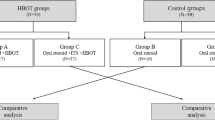Abstract
At present, there is still no agreement about the therapy of idiopathic sudden sensorineural hearing loss (ISSHL). Hyperbaric oxygen (HBO) is used in the therapy of ISSHL to increase the partial oxygen pressure and the oxygen concentration in the inner ear and also to improve the blood profile and the microcirculation. In our prospective randomized study, we aimed to investigate the therapeutic effects of HBO therapy in the 1st 2 weeks of the onset of ISSHL. Fifty-one hospitalized patients with confirmed ISSHL who had received therapy were grouped randomly into two groups. Twenty-one patients (group I) received steroids, plasma expander dextrans (rheomacrodex), diazepam, pentoxiphylline and salt restriction, and 30 patients (group II) received the same basic treatment with the addition of HBO therapy. Audiological assessments of the patients were performed before and after the treatment. The hearing gains at frequencies of 250, 500, 1,000, 2,000 and 4,000 Hz were calculated separately. The level of hearing loss at the five frequencies was assessed in three groups at the first visit: equal or below 60 dB, between 61–80 dB and equal or above 81 dB. The average of the mean hearing gains at the five frequencies of the patients according to the age groups in group II was compared. The mean hearing gains at the five frequencies were compared between the two groups, and statistically significant improvement was detected in all the frequencies except at 2,000 Hz in group II. The mean hearing gains in group II were found to be significantly high in patients with initial hearing levels up to 60 dB in comparison to patients with initial hearing levels below 60 dB. When age groups and mean hearing gains were compared, there was no statistically significant difference in group I. In group II, the mean hearing gains were 39.1±18.3 dB in patients younger than 50 years and 22.7±11.3 dB in patients older than 50 years (P=0.044). In conclusion, the addition of HBO therapy to conventional treatment modalities significantly improves the outcome of ISSHL, especially at the frequencies of 250, 500, 1,000 and 4,000 Hz and in hearing loss of above 61 dB. Furthermore, HBO therapy was found to be more effective in patients younger than 50 years.
Similar content being viewed by others
References
Appaix A, Demard F (1970) Hyperbaric oxygenotherapy and sudden perceptive deafness. Rev Laryngol Otol Rhinol (Bord) 91:951–972
Aslan I, Oysu C, Veyseller B, Baserer N (2002) Does the addition of hyperbaric oxygen therapy to the conventional treatment modalities influence the outcome of sudden deafness? Otolaryngol Head Neck Surg 126:121–126
Goto F, Fujita T, Kitani Y, Kanno M, Kamei T, Ishii H (1979) Hyperbaric oxygen and stellate ganglion blocks for idiopathic sudden hearing loss. Acta Otolaryngol 88:335–342
Hughes GB (1998) Sudden hearing loss. In: Gates GA (ed) Current herapy in otolaryngology-head and neck surgery, 6th edn. Mosby, St. Louis, p 41
Lamm H, Klimpel L (1971) Hyperbaric oxygen therapy in internal ear and vestibular disorders. Preliminary report. HNO 19:363–369
Lamm C, Walliser U, Schumann K, Lamm K (1988) Oxygen partial pressure measurements in the perilymph and scala tympani in normo- and hyperbaric conditions. An animal experiment study. HNO 36:363–366
Lamm K, Lamm H, Arnold W (1998) Effect of hyperbaric oxygen therapy in comparison to conventional or placebo therapy or no treatment in idiopathic sudden hearing loss, acoustic trauma, noise-induced hearing loss and tinnitus. A literature survey. Adv Otorhinolaryngol 54:86–99
Lamm K, Lamm C, Arnold W (1998) Effect of isobaric oxygen versus hyperbaric oxygen on the normal and noise-damaged hypoxic and ischemic guinea pig inner ear. Adv Otorhinolaryngol 54:59–85
Nagahara K, Fisch U, Yagi N (1983) Perilymph oxygenation in sudden and progressive sensorineural hearing loss. Acta Otolaryngol 96:57–68
Nakashima T, Fukuta S, Yanagita N (1998) Hyperbaric oxygen therapy for sudden deafness. Adv Otorhinolaryngol 54:100–109
Pilgramm M, Lamm H, Schumann K (1985) Hyperbaric oxygen therapy in sudden deafness Laryngol Rhinol Otol (Stuttg) 64:351–354
Takahashi H, Kobayashi S (1998) New indications for hyperbaric oxygen therapy and its complication. Adv Otorhinolaryngol 54:1–13
Vincey P (1978) Application and use of hyperbaric oxygenation in ENT. Rev Laryngol Otol Rhinol (Bord) 99:619–634
Author information
Authors and Affiliations
Corresponding author
Rights and permissions
About this article
Cite this article
Topuz, E., Yigit, O., Cinar, U. et al. Should hyperbaric oxygen be added to treatment in idiopathic sudden sensorineural hearing loss?. Eur Arch Otorhinolaryngol 261, 393–396 (2004). https://doi.org/10.1007/s00405-003-0688-6
Received:
Accepted:
Published:
Issue Date:
DOI: https://doi.org/10.1007/s00405-003-0688-6




